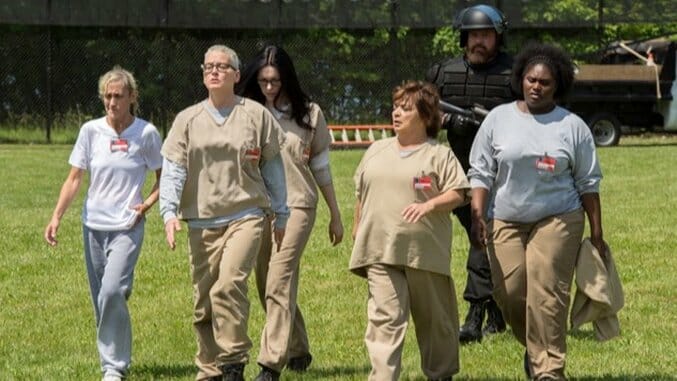In the Orange Is the New Black Opener, Piper is Still Dull and the System is Still Broken
(Episodes 4.01 and 4.02, "Work that Body" and "Powersuit")

This review contains spoilers from episodes one and two of Orange is the New Black, Season Four.
“You are absolutely unique. Just like everybody else. Margaret Mead.”—Piper Chapman
In the cellblock tangle of Orange Is the New Black’s fourth season, Piper Chapman’s a half-hearted chief. As MCC’s profit-taking leaves Litchfield overcrowded and understaffed, she tries to assert her power, staring into the middle distance and sniping at her new bunkmate—tactics learned at the Mean Girls School of Leadership, apparently—but she lacks Red’s stiff spine. Her arc, at least for now, seems clear: Either she’ll learn to rule with an iron fist, develop a more democratic approach (“You have to think globally,” the bunkmate advises), or suffer the consequences of a coup.
That Piper’s is (still) among the series’ least dramatic plotlines should come as no surprise. As her self-satisfied citation of the anthropologist Margaret Mead suggests, she was once our entree into the world of a women’s prison, but she is no longer Orange Is the New Black’s central subject—with her family and friends more or less absent from the picture, she’s become just another member of the sprawling cast. Her sense of control, like Caputo’s, is an illusion, thwarted by top bunks and damp towels, and compared with the most formidable inmates of seasons past (Red, Vee, even Gloria), she doesn’t exactly have her finger on the prison’s pulse. Of all the shit going down within Litchfield’s walls, she’s blissfully unaware.
To wit: Alex and Lolly kill Kubra’s hitman-turned-guard, dismember his body, and bury it in the garden, with Piper none the wiser. This has the unfortunate side effect of giving Lolly, the most contrived and endlessly annoying character to appear on the show since Larry left, additional screen time, and her incessant rambling rings hollow in the context of Alex’s ambivalence. Far more effective is the quiet, tearful moment in which Alex, after the startling sight of the man’s eyes flickering open, decides to end his life. Her remorse—for this choice, and for all the choices that led to it—is palpable, even if his death amounts to self-defense.
The real problem, of course, is that “Work That Body For Me” is as messy as Frieda’s “murder math”; without the focus of its ingenious flashbacks, Orange Is the New Black becomes so loose, so slack, that it struggles to sustain momentum. There are, as always, brilliant bits of comic invention—Black Cindy’s description of America as the “land of the free, home of the racist”—and political wit—the sharp visual contrast between the amateurish Litchfield regulars and the bruising, black-clad S.W.A.T. team brought in to usher the inmates back from the lake—but the whole is lesser than the sum of its parts. To “think globally,” as it were, demands more minute detail, more concentration, not less.
-

-

-

-

-

-

-

-

-

-

-

-

-

-

-

-

-

-

-

-

-

-

-

-

-

-

-

-

-

-

-

-

-

-

-

-

-

-

-

-








































